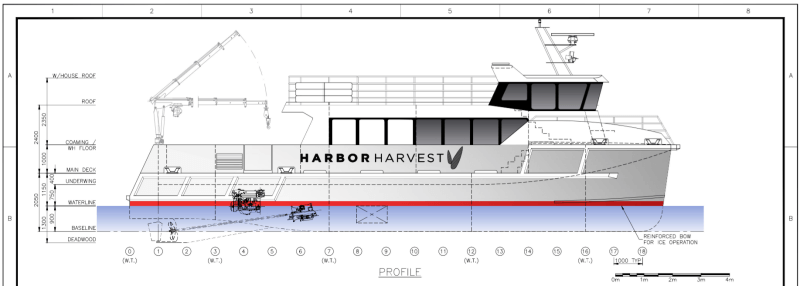The Quest To Connect The Two Sides Of The Long Island Sound
An audacious plan to connect the eight million people along Long Island Sound by what they eat.
The Quest To Connect The Two Sides Of The Long Island Sound
An audacious plan to connect the eight million people along Long Island Sound by what they eat.

With beautiful beaches and key proximity to New York City, the Long Island Sound is one of the most trafficked chunks of water on the East Coast. Shipping and fishing boats lie just out of sight of vacationers. And along the coasts are some spectacular farms: Connecticut’s dairy farms are renowned, Westchester County in New York has amazing livestock, and Long Island produces some of the best potatoes in the world.
Yet there’s basically no way to connect those farms. “We have a big traffic problem up here in Connecticut, and when we reached out to different farmers about transportation issues, we found that the guys up in Connecticut couldn’t trade with the guys on Long Island because it was a six- or seven-hour trip in congestion through the cities and bridges,” says Bob Kunkel, the managing partner of Harbor Harvest, a multi-pronged business based in Norwalk, Connecticut. The Sound may look narrow on a map, but it’s far too wide to stretch a bridge across the wider sections, and to get from, say, Norwalk out to the outer stretches of Long Island, you have to head west all the way to New York City, battle your way through the chaos it holds, and then muscle out into the barely-less-dense stretches of western Long Island. It’s an awful, awful trip, and most farmers just don’t bother with it.
Kunkel is trying to change that. “I’m a shipbuilder by trade,” he says, an expertise he put to use by creating a hybrid propulsion vessel, similar to a Prius car, for the Maritime Aquarium at Norwalk. It takes, says Kunkel, about 10,000 children per year out into the Long Island Sound for field trips and such.
But Kunkel’s grandfather was a butcher in The Bronx, and Kunkel never lost his love of food and food production. That came to fruition with the opening of Harbor Harvest, an elaborate locavore shop, in Norwalk, earlier this year. Harbor Harvest sources produce and meats from local providers and butchers on-site. (They also have a pretty neat setup to grow herbs indoors, right on-site.) But it didn’t address the problem Kunkel saw with the Long Island Sound.

So, Harbor Harvest, with Kunkel as the lead, is working to construct an electric boat to ferry goods across the Long Island Sound, finally opening the trade routes between Long Island, Connecticut, and Westchester. The ship, which is already planned out and, says Kunkel, will be delivered sometime in the last quarter of 2016 or first quarter of 2017, is a 65-foot electric catamaran that Kunkel describes as “essentially one large walk-in refrigerator.” It’ll be capable of holding 12,000 pounds of product in both interior refrigerated space and open space on the deck. “We charge it the same as Tesla or anything else that’s plugging in,” says Kunkel.
And the best part? Instead of that eight-hour brutal slog, the Harbor Harvest vessel can make the trip from Norwalk to the Glen Cove or Great Neck areas of Long Island in only two-and-a-half hours.
Kunkel’s gotten a lot of interest from local providers and even markets, he says. “There are four ports on Long Island that want the boat, and some are actually considering bringing the farmers market right to shore.” What could be better during the growing season that making your way down to the waterfront to buy goods that by almost any definition qualify as local – but which you couldn’t find until a trade route opened up?
Follow us
This work is licensed under a Creative Commons Attribution-NoDerivatives 4.0 International License.
Want to republish a Modern Farmer story?
We are happy for Modern Farmer stories to be shared, and encourage you to republish our articles for your audience. When doing so, we ask that you follow these guidelines:
Please credit us and our writers
For the author byline, please use “Author Name, Modern Farmer.” At the top of our stories, if on the web, please include this text and link: “This story was originally published by Modern Farmer.”
Please make sure to include a link back to either our home page or the article URL.
At the bottom of the story, please include the following text:
“Modern Farmer is a nonprofit initiative dedicated to raising awareness and catalyzing action at the intersection of food, agriculture, and society. Read more at <link>Modern Farmer</link>.”
Use our widget
We’d like to be able to track our stories, so we ask that if you republish our content, you do so using our widget (located on the left hand side of the article). The HTML code has a built-in tracker that tells us the data and domain where the story was published, as well as view counts.
Check the image requirements
It’s your responsibility to confirm you're licensed to republish images in our articles. Some images, such as those from commercial providers, don't allow their images to be republished without permission or payment. Copyright terms are generally listed in the image caption and attribution. You are welcome to omit our images or substitute with your own. Charts and interactive graphics follow the same rules.
Don’t change too much. Or, ask us first.
Articles must be republished in their entirety. It’s okay to change references to time (“today” to “yesterday”) or location (“Iowa City, IA” to “here”). But please keep everything else the same.
If you feel strongly that a more material edit needs to be made, get in touch with us at [email protected]. We’re happy to discuss it with the original author, but we must have prior approval for changes before publication.
Special cases
Extracts. You may run the first few lines or paragraphs of the article and then say: “Read the full article at Modern Farmer” with a link back to the original article.
Quotes. You may quote authors provided you include a link back to the article URL.
Translations. These require writer approval. To inquire about translation of a Modern Farmer article, contact us at [email protected]
Signed consent / copyright release forms. These are not required, provided you are following these guidelines.
Print. Articles can be republished in print under these same rules, with the exception that you do not need to include the links.
Tag us
When sharing the story on social media, please tag us using the following: - Twitter (@ModFarm) - Facebook (@ModernFarmerMedia) - Instagram (@modfarm)
Use our content respectfully
Modern Farmer is a nonprofit and as such we share our content for free and in good faith in order to reach new audiences. Respectfully,
No selling ads against our stories. It’s okay to put our stories on pages with ads.
Don’t republish our material wholesale, or automatically; you need to select stories to be republished individually.
You have no rights to sell, license, syndicate, or otherwise represent yourself as the authorized owner of our material to any third parties. This means that you cannot actively publish or submit our work for syndication to third party platforms or apps like Apple News or Google News. We understand that publishers cannot fully control when certain third parties automatically summarize or crawl content from publishers’ own sites.
Keep in touch
We want to hear from you if you love Modern Farmer content, have a collaboration idea, or anything else to share. As a nonprofit outlet, we work in service of our community and are always open to comments, feedback, and ideas. Contact us at [email protected].by Dan Nosowitz, Modern Farmer
December 21, 2015
Modern Farmer Weekly
Solutions Hub
Innovations, ideas and inspiration. Actionable solutions for a resilient food system.
ExploreExplore other topics
Share With Us
We want to hear from Modern Farmer readers who have thoughtful commentary, actionable solutions, or helpful ideas to share.
SubmitNecessary cookies are absolutely essential for the website to function properly. This category only includes cookies that ensures basic functionalities and security features of the website. These cookies do not store any personal information.
Any cookies that may not be particularly necessary for the website to function and are used specifically to collect user personal data via analytics, ads, other embedded contents are termed as non-necessary cookies.